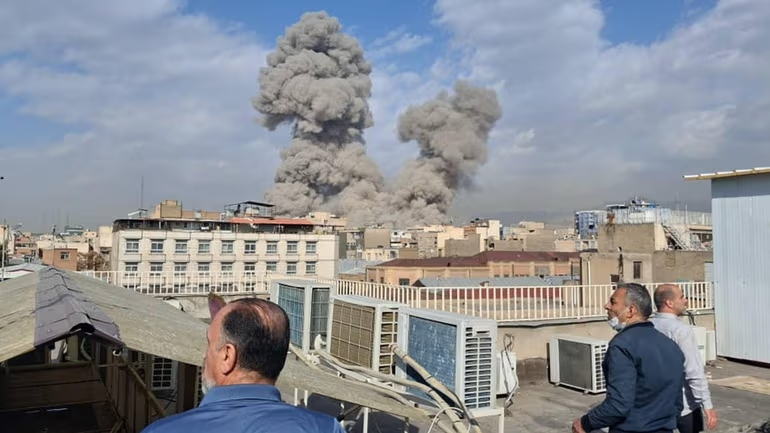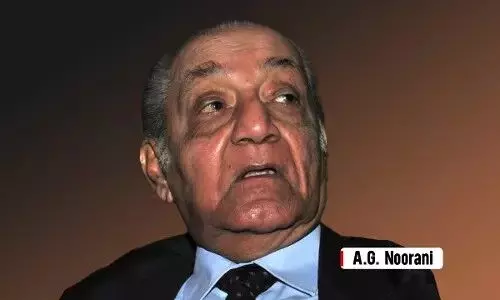
Noorani, scholar, historian, human rights defender passes away
text_fieldsAbdul Ghafoor Noorani, a former Supreme Court lawyer and distinguished constitutional expert, passed away on Thursday in Mumbai at the age of 93. Noorani, who was revered for his deep understanding of constitutional law, particularly on issues relating to Kashmir and Article 370, left behind a legacy of legal erudition and political analysis that will be remembered for generations.
Born in 1930, Noorani began his illustrious career as a lawyer at the Bombay High Court in 1953. Over the decades, he established himself as an authority on matters of constitutional law, with a particular focus on the complexities surrounding the Jammu and Kashmir issue.
His expertise on Article 370 of the Indian Constitution, which granted special status to the region until its abrogation in 2019, was widely acknowledged. Noorani’s insights into this subject were informed by both his legal acumen and his deep personal connection to the region.
Noorani was also a prolific writer, contributing regularly to leading publications such as Economic & Political Weekly, The Hindustan Times, The Statesman, Frontline, and Dawn. His writings covered a wide range of topics, from legal and constitutional issues to political and historical subjects, making him a respected voice in both academic and journalistic circles.
Over his lifetime, Noorani authored several scholarly books on constitutional law, politics, and history. Notable among these are The Kashmir Question (1964), Ministers’ Misconduct (1973), Constitutional Questions and Citizens’ Rights (2006), and The RSS: A Menace to India (2019). These works have served as valuable reference materials for both lay readers and scholars, cementing Noorani’s reputation as a thought leader in his field.
One of the significant episodes of Noorani’s legal career was his defence of Sheikh Abdullah, the first elected Prime Minister of Jammu and Kashmir after it acceded to India. Abdullah, a towering figure in the then Kashmiri politics, was detained for a long period, and Noorani’s advocacy on his behalf was both a legal and moral stand.
Noorani also represented former Tamil Nadu Chief Minister M. Karunanidhi in a case against his political rival Jayalalitha, further showcasing his versatility as a lawyer.
Despite his age and deteriorating health, Noorani remained committed to his work until his final days. He had been working on a book about the Supreme Court’s controversial judgment on the Babri Masjid case, a subject that was close to his heart.
Siddharth Varadarajan, the founding editor of The Wire, encapsulated Noorani’s legacy, describing him as “a legal scholar, historian, political analyst and human rights defender—all wrapped in one.” Varadarajan further highlighted the vastness of Noorani’s erudition, which spanned topics as diverse as India’s relations with China and Pakistan, the Indian constitution, British constitutional history, human rights, political trials, and the Indian freedom struggle.
Varadarajan noted that Noorani was equally adept at discussing figures like Lord Denning, Judge Winograd of the Israeli Supreme Court, and members of the Indian judiciary.
Varadarajan also remarked on Noorani’s relentless pursuit of official documents, particularly those that were unclassified but difficult to obtain. “Noorani was also a relentless—and ruthless—seeker of official documents… distrustful as he rightly was with the quality of newspaper reportage, especially on foreign policy and Kashmir,” he noted. Varadarajan recounted how Noorani’s determination to obtain a complete record of the failed India-Pakistan summit in Agra even led him to Islamabad to track down an elusive draft declaration, the results of which he published in Frontline magazine in 2005.
Noorani’s contributions were not limited to the legal and academic arenas. He was also a regular columnist and maintained a close connection with the world of journalism. He wrote extensively for The Indian Express and The Statesman and was known for his long-standing, albeit contentious at times, relationships with top editors across India.
Former Jammu and Kashmir Chief Minister Omar Abdullah expressed his sorrow on social media, describing Noorani as a “man of letters, an accomplished lawyer, a scholar & a political commentator". Asaduddin Owaisi, the chief of the All India Majlis-e-Ittehadul Muslimeen, hailed Noorani as “a giant among scholars” and acknowledged the profound influence Noorani had on his understanding of the constitution, Kashmir, and even the finer aspects of life, such as the appreciation of good food.
Abdul Ghafoor Noorani’s passing marks the end of an era in Indian legal and political scholarship. His legacy, however, lives on through his extensive body of work and the countless lives he touched through his writings and advocacy.























